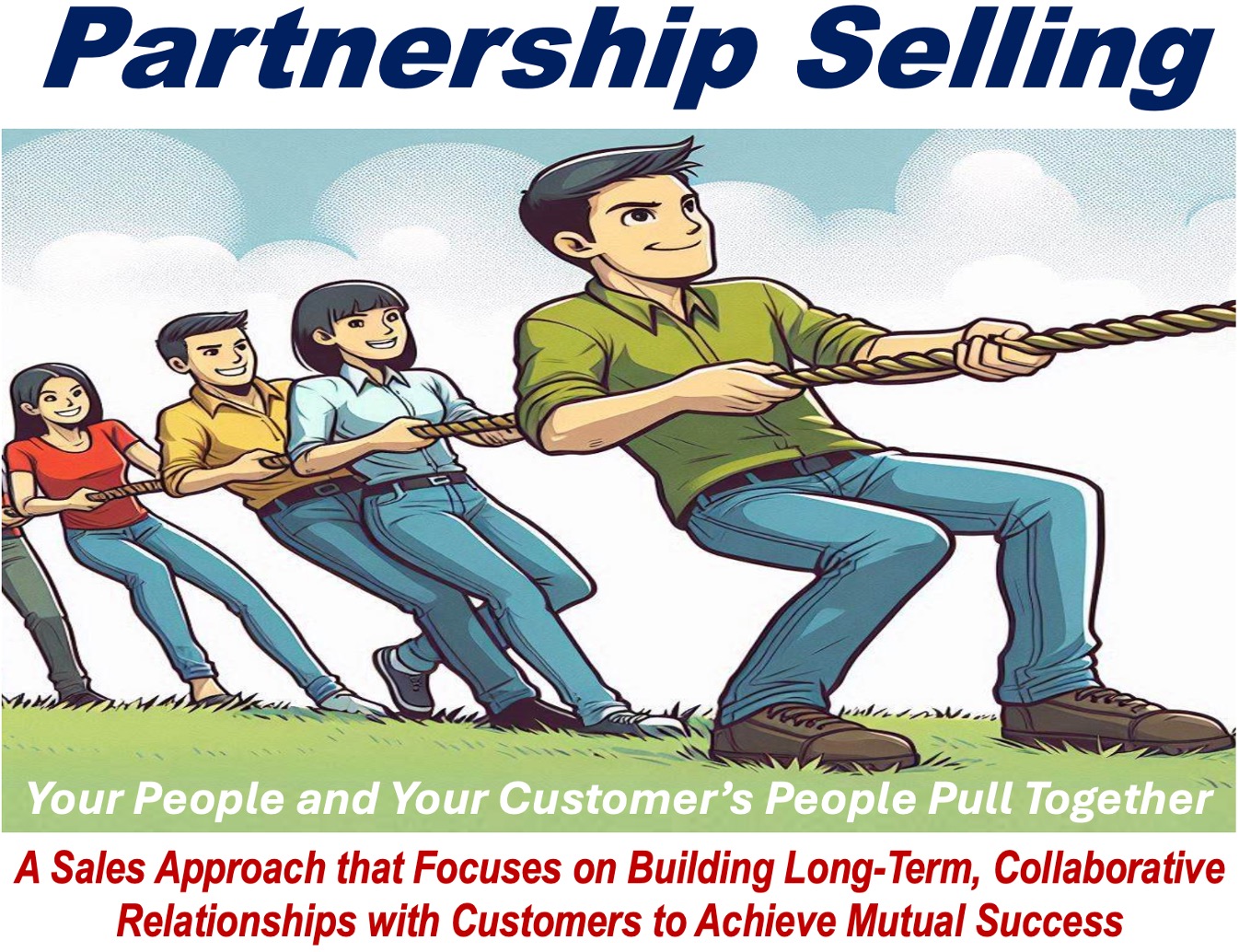In your sales strategy, do you focus on building long-term relationships with your customers? Rather than just aiming for a one-time sale, does your method emphasize collaboration between you and your customer to create a mutually beneficial outcome.
If so, you practice Partnership Selling or Partnership Sales – you are a Partnership Seller.
The idea behind this selling method is to treat your customers not just as buyers but as partners in a shared journey toward success.
Tldv.io has the following definition of partnership selling:
“Partnership selling is where your company and another company strategically become allies in business. You’ll set targets together and expand your horizons through shared resources and databases. The goal is to establish a long-term relationship and create real value and revenue for both companies involved.”
Partnership Selling – Trust
In partnership selling, the relationship is based on trust, open communication, and a deep understanding of your customer’s needs.
You work together to identify solutions that not only meet their immediate requirements but also support their long-term goals. This approach often involves a higher level of interaction and collaboration than traditional sales methods.

Benefits of Partnership Selling
Let’s take a look at some of the many benefits that partnership selling can offer your company.
-
Customer Loyalty
As a partnership seller, one of the key benefits you enjoy is a more loyal customer base compared to traditional sellers.
When your customers feel valued and see that you are genuinely interested in helping them succeed, they are more likely to stick with you in the long run.
This loyalty can result in repeat business and referrals, which is great for your company’s brand image.
-
Meeting Your Customer’s Needs
You are better able to create customized solutions that precisely meet your customer’s unique needs. By engaging in a collaborative process, you gain deeper insights into their challenges and goals, which enables you to offer tailored products or services that add real value.
This personalized approach not only enhances customer satisfaction but also strengthens your position as a trusted advisor, making your relationship more meaningful and productive.
-
Long-term growth
Long-term relationships with customers mean greater stability and long-term growth for your business.
Partnership selling encourages continuous communication and collaboration, allowing you to adapt to your customer’s evolving needs over time.
This ongoing engagement helps you stay ahead of the competition by anticipating changes in the market and responding proactively. As a result, your customers are more likely to view you as an indispensable partner, leading to sustained business success and increased profitability for both parties.
Core Principles of Partnership Selling
To successfully implement partnership selling, it’s important to focus on several core principles:
-
Understanding Your Customer
Take the time to really get to know your customer’s business, challenges, and goals. Find out as much as you can about their business environment, their pain points, and what matters to them the most.
This means asking the right questions and listening carefully to their responses. Do not underestimate the importance of listening. The world’s most successful salespeople are excellent listeners.
By understanding their unique situation, you can tailor your solutions to better meet their needs.
-
Building Trust
Trust is the foundation of any successful partnership. Be transparent, honest, and consistent in your interactions.
When your customers trust you, they are more likely to share important information that can help you serve them better.
-
Collaboration
Work closely with your customer to develop solutions that benefit both parties. This might involve co-creating products, services, or strategies that align with both your goals and theirs.
The more you collaborate, the more likely it is that your customer will see you as a valuable partner.
-
Long-Term Focus
Partnership selling is about looking beyond the immediate sale. Consider how your products or services can support your customer’s growth over time.
By focusing on their long-term success, you create a stronger, more resilient relationship.
-
Adding Value
Always be on the lookout for ways to add value to your customer’s experience. This could be through additional services, insights, or support that goes above and beyond their expectations.
The more value you provide, the more indispensable you become.
Similar Sales Methods
Several sales methods share key principles with partnership selling, emphasizing collaboration, customer focus, and long-term relationship building. Let’s take a look at four of them:
Like partnership selling, this method focuses on building long-term relationships based on trust and understanding, encouraging customer loyalty and repeat business.
Both methods emphasize close collaboration with customers to develop tailored solutions, fostering teamwork and mutual value creation.
This approach is similar in focusing on understanding customer problems and offering tailored solutions, aligning with the partnership goal of mutual benefit.
Both methods prioritize the customer’s needs, aiming to build strong, enduring relationships by addressing specific challenges and creating value.
Companies Leveraging Partnership Selling
Many of the world’s leading companies embrace partnership selling as a core component of their business strategy. These companies understand the value of forging strong, collaborative relationships with other businesses, vendors, and service providers to create customized solutions that meet their customers’ specific needs. Here are ten of them:
- Microsoft
- Salesforce
- IBM
- Apple
- SAP
- Amazon Web Services (AWS)
- Cisco
- Oracle
- Adobe
Final Thoughts
By adopting partnership selling, you position yourself not just as a vendor but as a trusted ally.
Your customers will appreciate the effort you put into understanding and supporting their needs, leading to more meaningful and profitable relationships over time.
This approach not only benefits your customers but also helps you build a sustainable business with a solid foundation of loyal clients.
